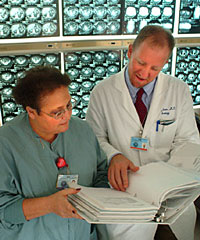Two New Clinical Trials:
Prevention of Prostate Cancer,
Osteoporosis in Men Under Study
 By Toni
Baker
By Toni
Baker
Oct. 20, 2004;
edited by J. Strax Oct. 27, 2004
Preventing prostate cancer and helping men in treatment for prostate cancer to avoid
osteoporosis is the focus of two new clinical trials at the Medical College
of Georgia.
Located in Augusta, Georgia, the Medical College is participating in a national study to find out whether men can
reduce their prostate cancer risk by taking a drug that halts the conversion
of testosterone, the male hormone, to a more potent hormone that stimulates
prostate cancer growth.
The lifetime risk of prostate cancer is about 1 in 6 for American men,
except for blacks as well as men with a family history who are at increased
risk, according to the National Prostate Cancer Coalition; the risk
increases to about 50 percent by age 80.
MCG also is a study site for a national study looking at whether a new
drug that slows bone resorption can help prostate cancer patients avoid
osteoporosis.
The cancer prevention study examines the potential of dutasteride, the
active ingredient in a drug marketed to treat prostate enlargement, a common
problem of aging.
"While there is no direct relationship between prostate enlargement and
prostate cancer, both cancerous and benign growth of the prostate appear to
be stimulated by this super hormone called dihydrotestosterone," says Dr.
James A. Brown, MCG urologist specializing in prostate cancer. For some
unknown reason, circulating male hormone, testosterone, is converted into
this more potent male hormone in the prostate gland and scalp.
"What is neat
about that is if you can prevent that conversion, you are taking away a
potent stimulator of cell growth," says the Georgia Cancer Coalition
Distinguished Cancer Clinician and Scientist. "Many of the cells in the
gland will atrophy and shrink away."
For the prevention study, MCG is evaluating patients age 50-75 with
elevated PSAs, a marker for prostate cancer, who have had a negative biopsy
in the last six months. The study runs for four years and participants will
receive additional biopsies at years two and four.
The osteoporosis prevention study looks at the bone-thinning disease
often associated with menopausal women. Loss of the female hormone,
estrogen, helps disrupt the normal balance between cells called osteoblasts
that make bone and osteoclasts that consume it.
Some details about this trial can be read online under the title
Calcium With or Without Estrogen and/or Risedronate in Preventing Osteoporosis in Patients with Prostate Cancer.
Another Phase III randomized trial for osteoporisis prevention is recruiting at Herbert Irving Comprehensive Cancer Center at Columbia University, New York, New York, 10032:Zoledronate and Estradiol in Preventing Bone Loss in Patients With Prostate Cancer
While men also naturally
experience a decline in their testosterone level with age, they keep making
the hormone throughout life and tend to start out with denser bones than
women, unless they get prostate cancer and receive hormonal blockade for the disease.
But prostate cancer, much like breast cancer, is a hormone-dependent cancer, If surgery, brachytherapy or external beam radiotherapy fail or if the disease is found too late for curative treatment, a mainstay of treatment of advanced disease is hormone
blockade.
"Testicles make male hormone," says Dr. Brown. "The prostate gland
is a sex organ that responds to male hormone. This gland develops at
puberty, with the influx of hormones, but it will often continue to grow
throughout life, which is why sometimes with age, men have problems with an
enlarged prostate. Prostate cancer also will grow more rapidly and aggressively with
male hormone circulating."
Faced with a need to halt testosterone production, most men today shun surgical removal of the testicles (orchiectomy) and prefer to take one or more drugs that suppress hormone
production. Intermittent use of hormonal blockade is becoming more widespread. Even so, these drugs take a toll on general health including bone density.
"The mainstay of prostate cancer therapy is anti-hormone
therapy and men typically are on it for years," says Dr. Brown. Side effects
often include markedly reduced libido as well as the increased risk of
osteoporosis.
The study looks as a new bisphosphonate, called risedronate, that may slow bone resorption and
may help correct the bone deficit that occurs with anti-hormone therapy, Dr.
Brown says. For this study, MCG is looking for men with prostate cancer who
are taking anti-hormone therapy for their disease. Participants will be
followed for two years; half will receive the study drug and half will
receive placebo. MCG expects to enroll about 20 patients in the study that
will follow 1,200 men nationally.
A Phase III trial that gives half the patients a placebo (a sugar pill or fake drug) puts you at risk 50/50 of going without a treatment you may need. Can you get an already tested, good-enough version of the drug without entering the trial?
If you already have early signs of weak bones, you may need to start taking a medication now.
Men taking hormonal blockade for prostate cancer are advised to get a baseline bone density scan and to start taking preventive medication such as Fosamax, Aredia or Zometa. Test have shown that hormonal treatment starts to weaken bone inmonths.
The 2 trials in the box above give patients a chance to take estrogen or estradiol along with calcium. These types of hormonal therapy may protect bones. Both these drugs are available on prescription. Some oncologists already prescribe them for prostate cancer patients in place of Lupron/Zoladex or after those drugs fail.
For more information about the studies contact Mary Anne Park, director
of the MCG Surgical Research Service, at 706-721-0193 or check the NCI listings.
This page reported by J. Strax, last updated October 27, 2004
 About Us | Content Policy/Disclaimer | Privacy Policy © 1997-2006 PSA Rising
About Us | Content Policy/Disclaimer | Privacy Policy © 1997-2006 PSA Rising

